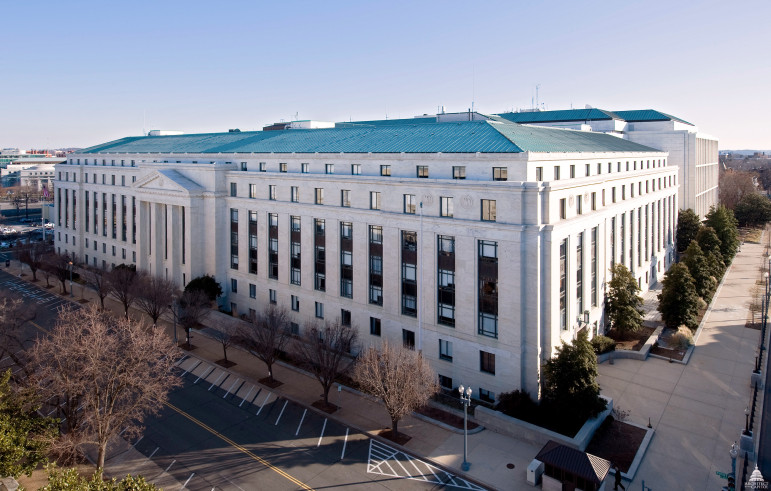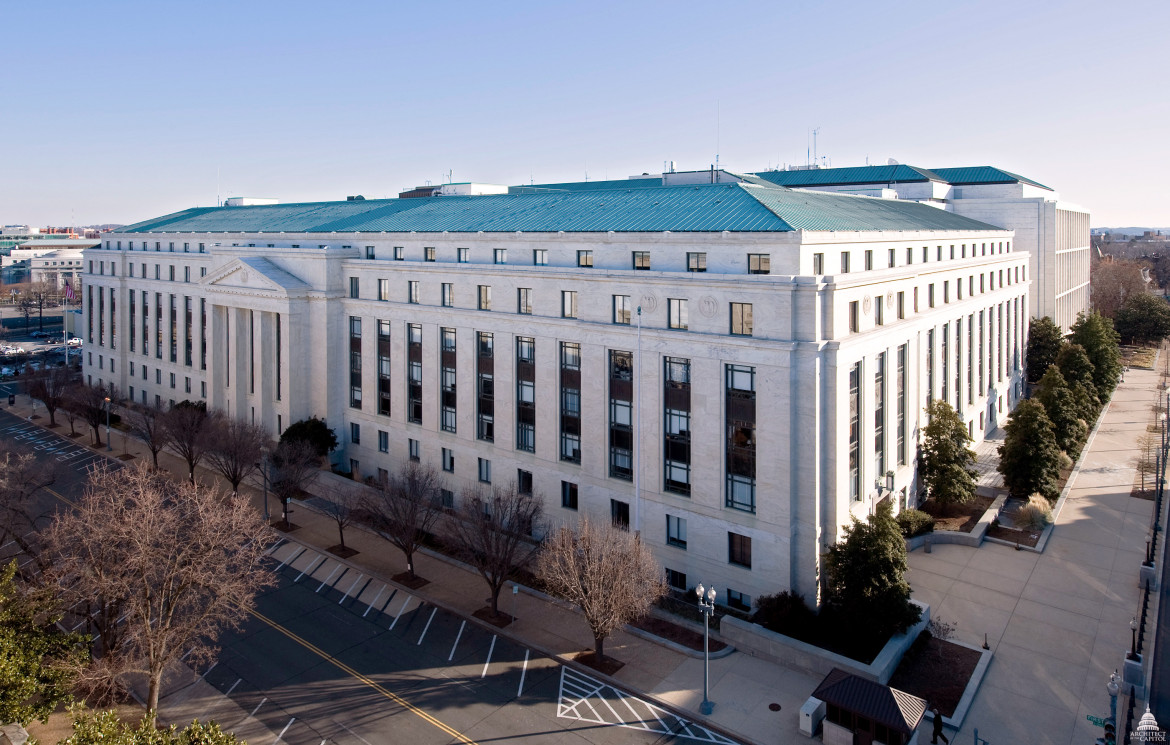
Architect of the Capitol
The Senate Judiciary Committee met in the Dirksen Senate Office Building today to discuss whistleblowers' concerns about the OJJDP.
WASHINGTON — Some states routinely violate a 1974 federal law designed to protect youths accused of juvenile offenses because of U.S. Department of Justice lack of oversight and enforcement, Sen. Charles E. Grassley said today.
“Last year, multiple whistleblowers contacted me about the Justice Department’s failure to follow the law,” said Grassley, R-Iowa, at a Senate Judiciary Committee hearing. “The whistleblowers allege that it is common knowledge among the states that the Justice Department did not take the four core requirements [of the law] seriously.”
Moreover, Grassley said, whistleblowers also claimed they faced retribution from the federal Office of Juvenile Justice and Delinquency Prevention (OJJDP). Whistleblowers “claimed the states know the Justice Department does not even check if they are submitting accurate reports in their annual application for grants,” he said.
The grants go to states in exchange for their complying with the requirements.
“So many states allegedly report whatever figures they want in order to keep the money flowing,” Grassley said. He is chairman of the Senate Judiciary Committee.
The eight-month inquiry, led by Grassley, at first focused on allegations that DOJ had paid millions of dollars in grant money to Wisconsin and four other states and territories that jailed vulnerable children with adults in violation of federal law.
Since then, the investigation has widened both in scope and geographically, with whistleblowers asserting that oversight failures may have led to unlawful OJJDP grants to Alabama, Idaho, Illinois, Puerto Rico, Rhode Island, Tennessee, Virginia and Washington, D.C.
Witnesses today testified about compliance (and noncompliance) with the Juvenile Justice and Delinquency Prevention Act (JJDPA), as well as about the Office of Justice Programs and OJJDP’s oversight and enforcement (or lack thereof), reprisal against whistleblowers and OJP’s response.
Andrea Coleman, who retains the title of disproportionate minority contact coordinator but says she’s been stripped of that duty for calling out OJJDP supervisors on their orders not to comply with DMC, said OJJDP has turned a blind eye to her DMC compliance complaints since 2009.
More troubling, however, Coleman said, OJJDP Administrator Robert Listenbee has “overturned” her recommendations of states’ DMC noncompliance.
“Mr. Listenbee and his leadership team announced that all states would get ‘a pass’ for their compliance with the DMC requirement with respect to their funding for fiscal year 2014,” Coleman said.
“As recently as last week, OJJDP staff was told that this ‘blanket pass’ would be issued again for fiscal year 2016 funds.”
Responding to questioning from Grassley, Karol Mason, the assistant attorney general for OJP, said, “We have been reviewing OJJDP’s compliance monitoring program, which has revealed a number of errors and systemic flaws in the program’s operation. …
“The three overarching problems with OJJDP’s compliance monitoring program are: 1. the regulations governing the program are old, outdated and inconsistent with the JJDPA, as amended; 2. the standards used to make compliance determinations are vague, thus injecting substantial subjectivity into the monitoring process, and 3. the extended timeline between a state’s filing of a compliance report and OJJDP’s compliance determination is inconsistent with the statute.”
Asked about the “blanket pass” on the DMC requirement, Mason said OJJDP is developing a new compliance monitoring “tool,” as the existing one is inadequate.
Mason did note significant progress in juvenile justice the past 35 years, saying violent crime arrest rates for youth are at their lowest point since at least 1980 and that the number of youths in locked residential placement had declined by 42 percent. Between 1997 and 2011, the population of youth in residential placement declined by 42 percent, while status offense detentions had also fallen.
Dean Hill Rivkin, a Knox County, Tenn., law school professor who operates a clinic that represents status offenders, also testified.
He said that when he failed to get help from a state agency in dealing with an exorbitant number of kids being locked up for status offenses, his clinic turned to OJJDP.
In July 2013, months after Listenbee took over, Rivkin said he got a call from an OJJDP official, who pledged to follow up with the Tennessee state agency. He was told OJJDP would conduct an audit.
But when Rivkin offered to share the Tennessee data, OJJDP declined — and the agency had looked at only four months’ data, the audit revealed. Listenbee also told Rivkin to file a Freedom of Information Act request to get the audit.
Elissa Rumsey, compliance monitoring coordinator at OJJDP, gave a long view of alleged noncompliance in her testimony.
In Wisconsin, she said, “there is significant evidence that [OJJDP grant] funding persists despite practices of regularly mixing foster children — caught after running away from domestic violence or sexual abuse — in jails with adult prisoners. The purpose of funding with controls is so that these type abuses will not occur. Serious enforcement must be restored.”
Then, she said, “Without warning, I was stripped of many of my professional responsibilities, especially my compliance-monitoring duties, and prohibited from conducting a compliance audit in the state of Wisconsin, which was scheduled for the spring of 2008.”
Her performance evaluation suffered, and her telecommuting agreement was canceled. However, the Merit Systems Protection Board found that both violated the Whistleblower Protection Act. The federal government did not reimbursed her for $750,000 in legal fees, however, though required to do so under the act.
U.S. Inspector General Jill Semmerling stepped into the investigation of the Rumsey case. However, she was abruptly removed from the case in October 2009 after working on it for 1½ years.
Under the JJDPA, OJJDP is required to reduce a state’s juvenile justice grant funding for a given year by 20 percent for each core requirement violated in the previous fiscal year. A state is to receive no JJDPA funds for the year following a violation unless it meets one of two criteria, which include showing “subsequent, substantial compliance with the requirement(s) it was violating.”
The act’s four core requirements vastly improved treatment of accused juveniles since 1974, keeping them from being detained for juvenile “status offenses” (crimes for kids, but not adults); preventing them from being detained in adult facilities and, if they are under exceptions, keeping them away from adult inmates; and requiring states to address disproportionate minority contact with the juvenile justice system.
Grassley and Sen. Sheldon Whitehouse, D-R.I., also a member of the Judiciary Committee, have said they plan to introduce a measure calling for a much more stringent JDDPA, which has not been reauthorized since 2002 and hasn’t undergone major overhaul in two decades.
The new reauthorization bill is expected to call for changes to core requirements, including phasing out the exception allowing detention of status offenders; significantly strengthening a requirement to reduce racial and ethnic disparities in the juvenile justice system; reducing the number of youths placed in adult facilities; offering states incentives for relying less on incarceration; and improving education for incarcerated youths.
